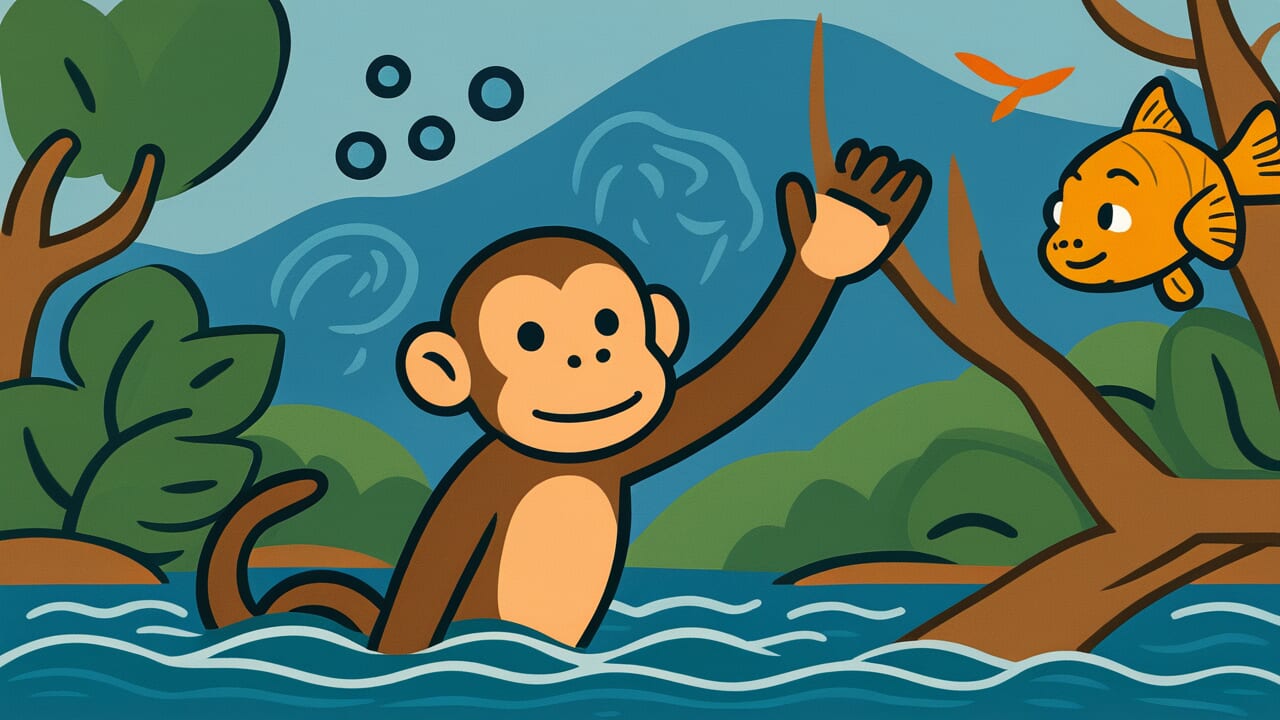How to Read “A monkey practicing swimming, a fish climbing a tree”
Saru no suiren, uo no kinobori
Meaning of “A monkey practicing swimming, a fish climbing a tree”
This proverb shows how foolish it is to ignore someone’s natural abilities and force them to do things they’re bad at.
Trying to teach a monkey to swim or making a fish climb a tree is clearly impossible. The same applies to people.
Everyone has things they’re good at and things they’re not. Forcing someone to do what they’re bad at without recognizing their individual talents makes no sense.
People mainly use this proverb in education and job placement situations. It criticizes decisions that ignore putting the right person in the right place.
For example, making someone good at math write essays, or putting someone who dislikes talking to people in sales.
Modern society recognizes how important it is to make the most of each person’s abilities. The lesson this proverb teaches becomes more important every day.
Origin and Etymology
The exact source of this proverb is unclear. However, the structure of the phrase shows a brilliant and easy-to-understand contrast.
It takes two creatures with completely different living environments, monkeys and fish. Then it describes them doing what they’re worst at.
Monkeys are famous for being excellent tree climbers, but they struggle with activities in water. Fish can swim freely in water, but they can’t even survive on land.
The core of this proverb reverses this natural order.
Suiren means swimming practice or training. By presenting this impossible combination of making monkeys practice swimming and fish climb trees, the proverb powerfully shows how foolish ignoring natural abilities is.
Japan has long had wisdom that observes the special characteristics of different creatures. People then draw lessons for human society from these observations.
This proverb is likely one of these teachings based on nature observation. The rhythm of the words is good, and the parallel structure makes it easy to remember.
This is probably why people have widely passed it down as a lesson.
Usage Examples
- Assigning him to an athletic department when he’s bad at sports is like a monkey practicing swimming, a fish climbing a tree
- Forcing a child with artistic talent to focus only on science subjects is a monkey practicing swimming, a fish climbing a tree
Universal Wisdom
A deep truth about human society hides behind why this proverb has been passed down for so long.
People often fail to see others’ individuality and natural abilities. Instead, they push their own values and standards onto others.
Why do people make this mistake? One reason is that people tend to believe what they’re good at or how they succeeded is the right way.
Also, fitting people into existing frameworks feels easier than truly understanding their potential. Recognizing others’ individuality means questioning your own values, which people unconsciously resist.
However, this proverb warns against such human arrogance. Monkeys have wonderful abilities that monkeys have. Fish have wonderful abilities that fish have.
Ignoring these abilities and trying to force them into a mold doesn’t just crush their potential. It becomes a loss for society as a whole.
Our ancestors observed creatures in nature and understood that diversity is the source of richness.
This proverb continues to teach us across time about the foolishness of trying to measure everything by one standard.
When AI Hears This
Monkeys and fish have each been optimized through the mind-bogglingly long process of evolution. They can now perform at their best in their current locations.
This is what evolutionary biology calls reaching a “local optimum.” In other words, monkeys are nearly perfect in tree environments, and fish are nearly perfect underwater.
However, an interesting trap exists here.
If we think about fitness landscape theory, monkeys sit at the peak of the “arboreal life mountain.” Fish sit at the peak of the “aquatic life mountain.”
A deep valley lies between these two peaks. If a monkey tried to adapt to aquatic life, it would first have to descend into this valley.
At the bottom of the valley, swimming would be mediocre and tree climbing would be mediocre. The creature couldn’t survive in either environment. Natural selection ruthlessly eliminates such half-baked individuals.
In reality, it took about 10 million years for whale ancestors to return from land to sea. Fossils from this transition period show a time when they were clumsy both on land and in water.
In other words, becoming extremely excellent in one field makes transitioning to another field biologically difficult.
Companies that succeed in existing businesses often fail at new ventures for the same reason. The more optimized an organization becomes, the less it can take the risk of descending into the valley.
This proverb brilliantly captures the immobility that excellence itself creates.
Lessons for Today
This proverb teaches modern people the importance of recognizing diversity and making the most of each person’s strengths.
At school and at work, we tend to measure people with one ruler. But what really matters is finding where each person can shine.
The same applies to you. Even if you’re not good at something compared to others, that doesn’t lower your value.
A monkey’s inability to swim doesn’t reduce the monkey’s value. Rather, knowing what you’re good at and what environment brings out your best becomes the first step toward a fulfilling life.
This lesson also applies when dealing with others. People raising children, managing subordinates, or leading teams should not push their expectations onto others.
Instead, they should develop eyes that can see each person’s unique potential. A society where everyone can show their strengths in their own way is truly a rich society.



Comments